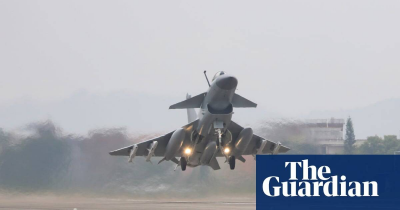The Guardian-Taiwan considers joining ICC to deter potential China invasion
December 31, 2023 5 min 871 words
这篇报道揭示了台湾政府考虑加入国际刑事法院以阻止潜在的中国入侵。这一举措旨在通过国际法制裁中国领导人习近平,以防止其对台湾实施战争行为。尽管这一决定可能无法单独阻止中国的攻击,但却在全球政治格局中引入了新的维度。习近平在新年致辞中强调中国与台湾“统一”是不可避免的,这表明紧张局势可能升级。加入国际刑事法院不仅可提升台湾的国际地位,也为亚洲国际法制度注入新动力。这一倡议在台湾内部尚需深入讨论,但它向全球传递了台湾拥抱国际法与民主的决心。
Taiwan’s government is considering joining the international criminal court, in part to increase deterrence of a Chinese attack or invasion.
Supporters also say it would help universalise the international legal system, which has a low presence in Asia, and increase Taiwan’s global participation at a time when Beijing works to keep it as isolated as possible.
The court was established by the Rome statute, which defined four core international crimes: genocide, crimes against humanity, war crimes and crimes of aggression. It has operated since 2002, prosecuting dozens of alleged war criminals. In March the ICC issued an arrest warrant for the Russian president, Vladimir Putin, over the forced deportation of children from Ukraine.
Taiwan joining the ICC would allow investigation and warrants against Chinese leader Xi Jinping under international law if he ordered or oversaw acts of war or war crimes against Taiwan on its territory. Supporters have said this could help deter Xi from acting on his intention to annex Taiwan, a self-ruled democracy whose people overwhelmingly reject the prospect of Chinese subjugation.
“[Taiwan joining the ICC] alone may not deter a decision to attack Taiwan,” said Kevin Chang, an international lawyer and associate professor at Taiwan’s National Chengchi University. “But with China trying to assert leadership in the world, this is a significant calculation China has to make.”
Because of the warrant, Putin did not travel to the Brics conference in South Africa earlier this year as he faced the risk of arrest and deportation to The Hague if he landed in the ICC member state.
Prof Jonathan Hafetz, of Seton Hall law school in the US, said he did not think Taiwanese membership of the ICC would have a strong deterrent effect alone, but would probably introduce “another dimension to the larger geopolitical landscape that China would have to navigate”.
The proposal was formally recommended by an independent annual review of Taiwan’s human rights efforts earlier this year. There since have been a number of discussions among members of Taiwan’s judiciary, government and legal profession.
One mechanism for Taiwan to seek ICC membership is to sign up to the Rome statute. The statute is not a UN treaty, but the UN secretary general is the administrator of its membership, and it is unclear whether he could or would refuse Taiwan.
Under the second mechanism, Taiwan’s administrative wing – its president – could unilaterally declare acceptance of ICC jurisdiction over Taiwan’s territory.
Only Ukraine and Palestine have joined by declaration, with Palestine later signing the Rome statute. Legal experts said it wasn’t clear how the ICC would respond to a state with undetermined status attempting the same. Taiwan is not a UN member state and is only recognised by 13 other countries.
“I believe that [rejecting Taiwan] would be extremely risky on the ICC’s part because that would equate to a definitive determination on the question of Taiwan’s statehood and thereby exclude the whole of Taiwan from the reach of international criminal justice,” said Chang.
Beijing is not party to the ICC, and any future investigation in the event of an attack would see little cooperation from China, but it still wields global influence.
“I think China could try to undercut the legitimacy of any ICC action by underscoring the selective nature of international criminal justice and criticising it as a tool of western powers that is applied inconsistently,” Hafetz said. “China would also likely argue that any recognition by the ICC of jurisdiction over Taiwan … is illegitimate.”
With Taiwan heading to a presidential election on 13 January, imminent movement on the proposal is unlikely, but the Guardian understands there are high-level discussions taking place in government.
Taiwan’s department of human rights and transitional justice, which is tasked with responding to the annual human rights review, told the Guardian the ICC recommendation needed “more assessment from relevant departments”.
Prof Ford Fu-Te Liao, from Taiwan’s Academia Sinica, said there were domestic and international political considerations.
“We have to find first a domestic consensus,” Liao said. “I think before we make a declaration there needs to be some political communication with the ICC and several states who are members, to understand what their views are … I would say European states will play a major part on this issue. They don’t want another Ukraine.”
The Guardian asked the three main political parties vying for the presidency for comment. The campaign team for the ruling party’s candidate, Lai Ching-te, said if elected he would be “happy to see the judicial community continue to discuss any opportunities that can further integrate Taiwan with the international judicial system”.
A spokeswoman for the Taiwan People’s Party said the presidential candidate Ko Wen-je believes Taiwan should establish “more connections with the world in all aspects, so as to make Taiwan safer”. She said the party was “optimistic” about talks on Taiwan signing the Rome statute and it becoming “an additional security barrier”.
The KMT opposition did not respond to multiple requests for comment.
Additional research by Chi Hui Lin

